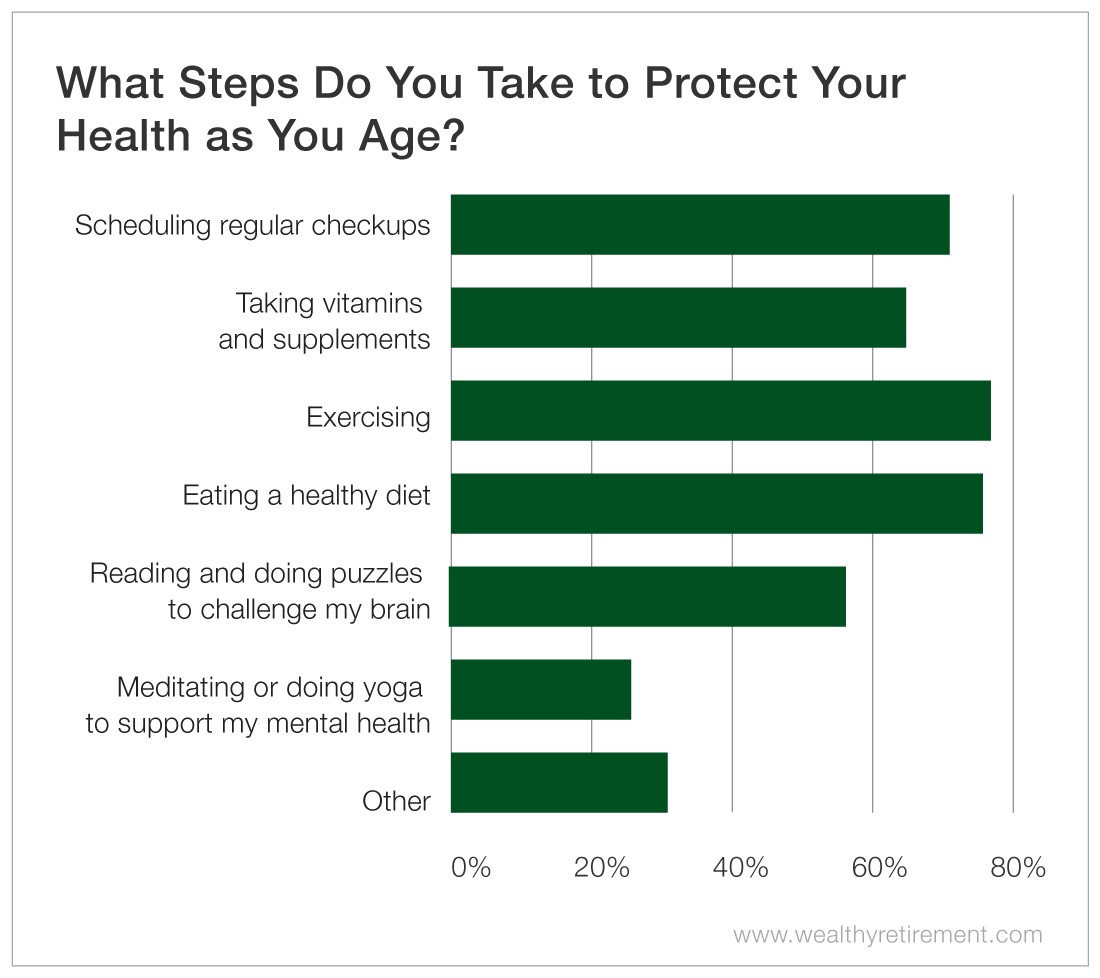You likely perform regular maintenance on your home to ensure that it will support you for years to come. You likely support children or other loved ones…
And hopefully you may even rebalance your portfolio each year.
But how often do you perform maintenance on yourself?
Taking care of our health holistically – including our mental and cognitive health – becomes even more critical as we age.
And while it takes more than an apple daily to prevent surprise trips to the doctor, taking regular steps to protect our health will pay dividends in the long run.
So in honor of World Osteoporosis Day tomorrow and National Check Your Meds Day on Monday, we decided to celebrate health in this week’s survey.
Health Is Not a Zero-Sum Game
We polled our readers to learn which steps they take to protect their health as they age.
Almost 80% of our readers reported that they exercise and eat a healthy diet – an excellent start.
More than 80% of adults don’t get enough aerobic or muscle-strengthening exercise to meet national health guidelines.
However, it seems that our readers recognize the importance of getting moving – at any age.
In fact, even if you don’t currently have a fitness regimen, there’s no reason to get discouraged.
Granted, starting early and staying consistent will ensure you reap the best benefits for heart health and metabolic health. However, studies have shown that even at age 80, seniors who begin exercising are equally able to build muscle.
(Building muscle and balance is especially important as we age. An older adult lands in the emergency room for a fall every 11 seconds, so any practice that helps you be steadier on your feet is invaluable.)
Additionally, pursuing a healthy lifestyle can lower your risk of Alzheimer’s and dementia – so when it comes to fitness and nutrition, there’s no time like the present…
Some readers even shared that they take healthy eating a step further by avoiding processed foods or following a vegan diet.
(But fortunately for those of you who – like me – are fond of shrimp salad and ice cream, the benefits of these strategies are not all or nothing. Even simple steps such as eliminating artificial sweeteners, like those in diet sodas, can reduce your stroke and dementia risks.)
Three-quarters of our readers said that they schedule regular checkups.
Other readers reported taking vitamins and supplements and challenging their brains with puzzles, reading or mahjong.
However, less than one-quarter of our respondents indicated that they meditate or practice yoga to support strong mental health.
Age Well by Keeping Mindful of Holistic Health
Yoga and meditation are straightforward but often overlooked ways to manage stress and support bone and joint health. If your fitness regimen feels lacking, consider giving them a shot.
Tai chi, qi gong and acupuncture, which some of our readers reported practicing, have similar benefits.
Other readers wrote in to share that they take alternative steps to protect their health…
“The healthiest thing I’ve done is get a dog. An hour of hiking or walking every day is great.”
This is an especially timely testimonial for our four-legged friends, as October is the American Society for the Prevention of Cruelty to Animals’ Adopt a Shelter Dog Month.
If you are able to care for a pet and provide it with regular exercise, consider fostering or adopting.
There are even programs, like Pets for the Elderly, that make it easy and less expensive for seniors to adopt companion animals.
“Avoiding negativity.”
A recent study by the U.S. National Center for Post-Traumatic Stress Disorder showed that optimistic people are up to 70% more likely to reach age 85 than their pessimistic counterparts.
It’s clear that prioritizing your mental and social health has rewards.
In fact, setting aside time to socialize and relax with friends at age 60 can even lower your risk of dementia.
(Isolation, on the other hand, increases your risk of poor health by more than 50%.)
In addition to promoting strong social health, some readers reported seeking companionship with a higher power…
“Faith.”
While science shows us that simple, everyday steps can have dramatic effects on our physical and cognitive health, it is crucial to not neglect our mental and spiritual health when we talk about self-care.
So the next time you’re taking your car for an oil change or even giving yourself a tune-up at the physical therapist’s…
Consider scheduling lunch with a friend…
Taking a gentle walk…
Attending a worship service…
Having a quiet moment…
Or picking up a light read…
Or a corgi.
Don’t forget the “little things” – it’s one of the secrets to a wealthy, healthy and long retirement.
Good investing,
Mable

